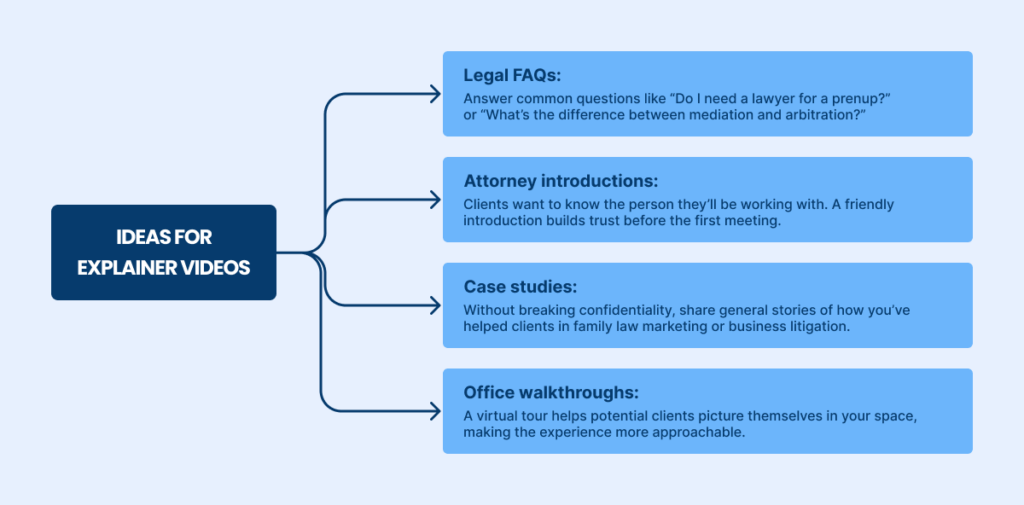The legal world is no stranger to change, but the pace of innovation in marketing is faster than ever.
As competition grows and client expectations evolve, law firms must do more than advertise—they need to connect, engage, and stand out.
Today’s clients expect more than just expertise. They seek trust, convenience, and personalized experiences.
According to the Legal Process Outsourcing Global Report, the legal market value is projected to hit $45.4 billion in 2028 at a compound annual growth rate (CAGR)of 26.4%.
Source: Legal Process Outsourcing Global Report
From AI-driven tools that anticipate client needs to short, punchy videos that simplify complex legal jargon, the way law firms attract and retain clients is undergoing a dramatic shift.
A reliable Law Firm Marketing Agency can redefine how attorneys showcase their value and build relationships through marketing.
Let’s explore the marketing trends shaping the legal industry and transforming the way firms grow in 2025.
1. What AI Can Do for Lawyers Beyond Chatbots
AI isn’t about robots taking over mundane tasks.
It’s about making lawyer marketing smarter, faster, and more client-focused.
Source: Exploding topics
Consider the tool that can predict what your clients need before they even ask for it. That’s where AI for law firms comes into play.
- Boosting operational efficiency: AI tools can handle repetitive tasks like scheduling appointments or responding to common client queries. This frees up your team to focus on more meaningful interactions.
- Crafting better content: AI-powered writing assistants help create engaging blog posts, email campaigns, and legal advertising materials that resonate with your audience. For example, a family law practice could use AI to write blog posts addressing common divorce questions tailored to local SEO needs.
- Data-driven decision-making: AI tools analyze client behavior to provide insights into what services are in demand. This could mean identifying that your law firm email marketing campaigns perform better when personalized to a specific legal service, such as estate planning or business law.
Example: A midsize law firm used an AI-driven chatbot to manage initial client intake, answering basic questions about case eligibility. Within six months, they reported a 25% increase in qualified leads because potential clients could quickly determine if the firm was a fit for their needs.
How AI Personalization Creates a VIP Experience
Clients don’t just want legal help-they want to feel understood.
AI tools can make every interaction with your firm feel tailor-made, building trust and encouraging long-term relationships.
- Personalized website experiences: AI can track user behavior and suggest services based on their browsing history. For instance, if someone is exploring family law marketing topics, your website could display related blog posts or downloadable guides on custody agreements.
- Tailored communication: Law firm email marketing benefits from AI’s ability to segment audiences. For example, sending specific newsletters to past clients about legal updates that might impact them builds credibility and keeps you at the top of your mind.
- Custom legal documents: AI simplifies the creation of contracts, wills, and other documents by adapting templates to client-specific details, saving time while maintaining accuracy.
Why it matters: Personalized experiences make clients feel valued, increasing satisfaction and referrals. A 2024 study found that businesses offering tailored services saw an 84% higher client retention rate, which could significantly impact law firm reputation management.
2. The Power of Data: Turning Insights Into Clients
Data is the foundation of smarter attorney marketing.
It tells you what potential clients want, how they behave, and where they’re looking for services.
Without it, your legal advertising is like throwing darts in the dark.
- Understand client needs: By analyzing case trends and online search patterns, you can identify what legal services are in demand. For instance, data might show a spike in interest in estate planning after new legislation passes.
- Refine your approach: Tools like Google Analytics or legal CRM software help track how clients interact with your website and marketing materials. Are they clicking on blog posts about family law marketing or filling out consultation forms for personal injury cases? Use this data to focus your efforts on what works.
Example: A law firm specializing in personal injury cases analyzed their local market data and found a high volume of searches for motorcycle accident lawyers. They adjusted their advertising campaigns to highlight this specialty, resulting in a 40% increase in consultations.
Using Data to Master Local SEO
Local SEO is one of the most effective ways to attract clients searching for legal help in their area.
Data makes it possible to refine your approach and dominate local search results.
- Track trending queries: Use tools like Google Trends or keyword planners to identify the legal questions people are asking in your area. For example, if “child custody lawyer near me” is a popular search, create blog posts or landing pages targeting this keyword.
- Optimize Google Business Profiles: Ensure your law firm’s name, address, and phone number (NAP) are consistent across platforms. Data shows that businesses with optimized profiles are twice as likely to be trusted by clients.
- Claim local citations: Directories like Avvo, Yelp, and Justia are critical for boosting local visibility. Ensure your firm is listed and regularly update your information.
Why it works: A well-executed local SEO strategy puts your firm at the top of search results when clients need you most. According to BrightLocal, 76% of people searching for local services visit a business within 24 hours of finding it online.
3. Videos Speak Louder Than Words: Why Law Firms Need a Camera
In the world of lawyer marketing, videos grab attention in ways text often can’t.
They’re quick, engaging, and help potential clients understand complex legal topics without feeling overwhelmed.
Source: Wyzowl
People are busy and don’t want to spend time reading pages of content when a two-minute video can deliver the same information.
Why short-form videos work: Videos simplify legal advertising by breaking down intimidating topics like “How divorce mediation works” or “What to expect in a personal injury consultation.” The visual format helps clients feel informed and less apprehensive about reaching out.

Example: A family law attorney created a series of 90-second videos answering common custody-related questions. These videos were shared on social media and embedded on their website. Within three months, website inquiries doubled as clients felt more confident about reaching out.
Getting Creative: Beyond the Talking Head
Explainer videos are valuable, but there’s more to video than just talking into a camera.
Creativity can help your firm stand out, especially in the competitive field of attorney marketing.
- Innovative ideas for legal videos:
- A Day in the Life of a Lawyer: Show what your work involves to demystify the process for potential clients.
- Animated explainers: Use animation to illustrate complex legal processes, such as how bankruptcy filings work or the steps in a criminal defense case.
- Behind-the-scenes content: Share moments like team meetings, court prep, or celebrating a big win (while respecting client confidentiality). This humanizes your firm and builds credibility.
Why creativity matters: Legal topics can feel overwhelming or dull to clients. Creative videos not only educate but also make your firm more relatable. Statistics show that 72% of people prefer video over text when learning about services, making this format essential for law firm reputation management.
4. Social Media for Lawyers: From Hashtags to Relationships
Social media marketing for law firms isn’t just about broadcasting your services.

It’s about building relationships with potential clients and engaging in conversations that matter to them.
- Shift to engagement: Static posts listing your practice areas won’t inspire much action. Instead, host live Q&A sessions on Instagram or LinkedIn where you address common legal concerns. Respond to comments and direct messages promptly to create a sense of accessibility.
- Storytelling and user-generated content: Share stories of your firm’s impact. For example, a video testimonial from a satisfied client (with their consent) can be more persuasive than any advertisement. Encourage clients to tag your firm in posts or reviews to expand your reach.
Example: A small business lawyer hosted a LinkedIn Live session on “How to Protect Your Business from Lawsuits.” The interactive format allowed viewers to ask real-time questions, leading to 10 new consultation requests within a week.
The Hidden SEO of Social Media
Social media profiles are now part of search visibility, especially for local SEO for law firms.
Optimizing your accounts can make a significant difference.
- Hashtags and keywords: Use location-specific hashtags like #SeattleDivorceLawyer or #MiamiPersonalInjury to appear in relevant searches. Pair this with legal-specific tags like #FamilyLawMarketing to reach a broader audience.
- Profile optimization: Ensure your firm’s contact details, services, and areas of practice are clearly listed on platforms like Instagram, Facebook, and LinkedIn. Accurate and consistent information boosts credibility.
- Content repurposing: Share snippets of blog posts or client testimonials as bite-sized content. For example, turn a blog about estate planning tips into an Instagram carousel.
Why it matters: Optimized social media accounts increase your visibility where people are already searching. A study found that 54% of social media users use platforms like Facebook to research products and services, including legal ones.
5. The Concierge Approach: Virtual Handholding for Clients
Clients navigating legal issues often feel lost.
The concierge approach ensures they feel guided and supported from the moment they visit your website.
- How it works: AI for law firms makes this approach possible. Tools like virtual assistants can provide personalized website tours, answering FAQs or directing users to schedule consultations. For example, a potential client visiting a family law page could be shown resources specific to custody disputes.
- Automation with a personal touch: Tools like custom scheduling apps allow clients to book appointments without the back-and-forth. Even better, automated confirmation emails can include personalized tips, such as what documents to bring to their first meeting.
Example: A bankruptcy attorney implemented an automated chatbot to handle inquiries outside office hours. The bot answered basic questions and scheduled follow-ups, resulting in a 20% increase in consultations within three months.
Why a Personalized First Impression Matters
First impressions matter, especially in attorney marketing.
Clients who feel welcomed and valued are more likely to trust your firm.
- Smooth onboarding processes: Virtual assistants or interactive website tools can guide clients through intake forms or answer common questions. This removes barriers and makes reaching out less intimidating.
- Building trust early: Use welcome emails to introduce your team, explain the process, and set expectations. For example, a family law marketing email might explain what to expect in the first consultation and provide links to helpful resources.
- Data-driven personalization: Analyze user behavior on your website to tailor their experience. If someone frequently visits your personal injury section, you can email them relevant success stories or blog posts.
Why it’s essential: The legal marketing survey found that firms with personalized onboarding saw 30% higher client satisfaction rates. Happy clients are more likely to refer friends or leave positive reviews, boosting law firm reputation management.
Conclusion: What These Lawyer Marketing Trends Mean for 2025
The legal industry is stepping into a new era of marketing, one that prioritizes connection, innovation, and accessibility. These trends are opportunities for law firms to build deeper relationships with their clients and redefine how they present their expertise.
[A] Growth Agency will help firms stand out in an increasingly competitive field. We understand that legal advertising requires a balance between professionalism and approachability.
As the marketing landscape evolves, staying relevant means adapting to these shifts thoughtfully.
Growth is our driving force. We believe in the power of data to inform and drive every strategy, ensuring our actions are as effective as they are innovative.
Growth isn’t just what we offer.

